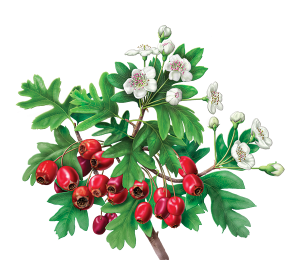There are many different herbs used for the cardio/heart system. Different herbs are used for specific issues, like the valves, electrical irregularities, blood pressure, arterial issues, etc. But Hawthorne is one cardio herb that is used for a variety of issues.
Whether the issue concerns blood vessels as with congestive heart failure or chest pains or an irregular heart beat or low or high blood pressure or high cholesterol (and beware of the whole cholesterol myth) or hardening of the arteries…Hawthorn could be part of the protocol.
Hawthorne has a variety of medicinal impacts on the body:
- vasodilator – helps the peripheral & central arteries to dilate and reduces peripherial resistance – which helps to reduce high blood pressure
- reduces LDL and TGs (cholesterols and triglycerides – compounds that are detrimental to the heart) in the liver and the aorta (largest arterial blood vessel in the body) by increasing excretion of bile (made from LDL); enhancing LDL receptors; and acting as an anti-oxidant
- increases nitric oxide which relaxes/dilates the arteries allowing greater blood flow through the arteries reducing the demand on the heart to pump the blood. In addition, that helps with penile dysfunction. When the arteries in the penis can dialate, allowing greater blood flow, than the erection can come more easily and stay much longer
- increases vascular endothelial growth factor (VEGF) an important signaling factor involved in healing the arteries
- enables a mild dilation of coronary vessels
- increases enzyme metabolism in the actual heart muscle – improves heart function (enzyme insufficiency can lead to anaerobic glycolysis that is typical of heart disease)
- increases the heart’s oxygen utilization; yet decreases oxygen utilization during exercise in patients with coronary sclerosis
- reduces ischemia reaction in the exercise EKG
- increases coronary blood supply – decreases frequency of anginal attacks; increases cardiac output by directly influencing the smooth muscles of the arterial cardiac blood vessels
- helps to eliminate cardiac rhythm disturbances
- in patients with primary heart disease, Hawthorne normalized heart dynamics
- in patients with secondary heart disease, Hawthorne still had a significant impact, although less so
- in patients whose heart disease was caused by the hepatitis or other liver diseases, Hawthorne had a significiant impact
- a German formula including Covallaria majalis (Lily of the Valley), Crateagus Oxycanthus (Hawthorne), Primula off. (Cowslep) and Valeriana off. (Valerian) – also proved “extremly effective”
- acts as an anti-oxidant
- enhances liver function (turning LDL into bile; anti-oxidant; glycolysis; etc)
Note: these effects are all done accomplished without the side effects of synthetic Western pharmaceuticals; without changes in urinary excretion and respiration; without pulmonary damage
How does it work? Hawthorn contains a number of compounds:
- acetylcholine
- anthyocyanins
- caffeinic acid
- chlorogenic acid
- flavonoids
- hormones
- oleanolic acid
- oxyacanthine
- phenolic acids
- plant acids
- saponins
- triterpene acids
- ursolic acid
And in particular some compounds that have a cardiac reaction:
- oligomeric procyanidins (OPCs)
- vitexin
- vitexin
- O-rhamnoside
- quercetin
- hyperoside
OPCs appear to protect the arterial membrane by inhibiting several enzymes that degrade the infrastructure of vascular tissues including:
- collagen
- elastin
- hyaluronic acid
In addition, OPCs eliminate free radicals that cause injury to the vascular lining and at the same time strengthen the vascular inner lining.
Compared to digitalis, Hawthorne is much milder and safer to use. Hawthorne is a tonic for both high and low blood pressure, as well as tachycardia and arrhythmia. It has a mild anti-arteriosclerotic effect; an antispasmodic effect and a sedative effect.
When one is using these herbs, one should consult with a Master Herbalist; a Dr of Natural Medicine; or a Naturopath to make sure that they are being taken in the right combination for your body; with or without foods; and at the right time of day.
In addition, remember most drugs are synthetic compounds of the real compounds in real food and herbs – so when taking supplements, herbal tinctures, and other REAL compounds – they can enhance, deplete or interfere with the synthetic drugs you may be taking. Everything needs to be taken into consideration.
Here’s to your health!
For more information, contact: holly@choicesunlimited.ca
Dr. Holly is a naturopathic doctor that holds a PhD in Psychology and Biochemistry, specializing in balancing mind, body and energy of the system.
Disclaimer: This article provides general information only and is not a substitute for the medical advice of your own doctor or other health care practitioner.

























